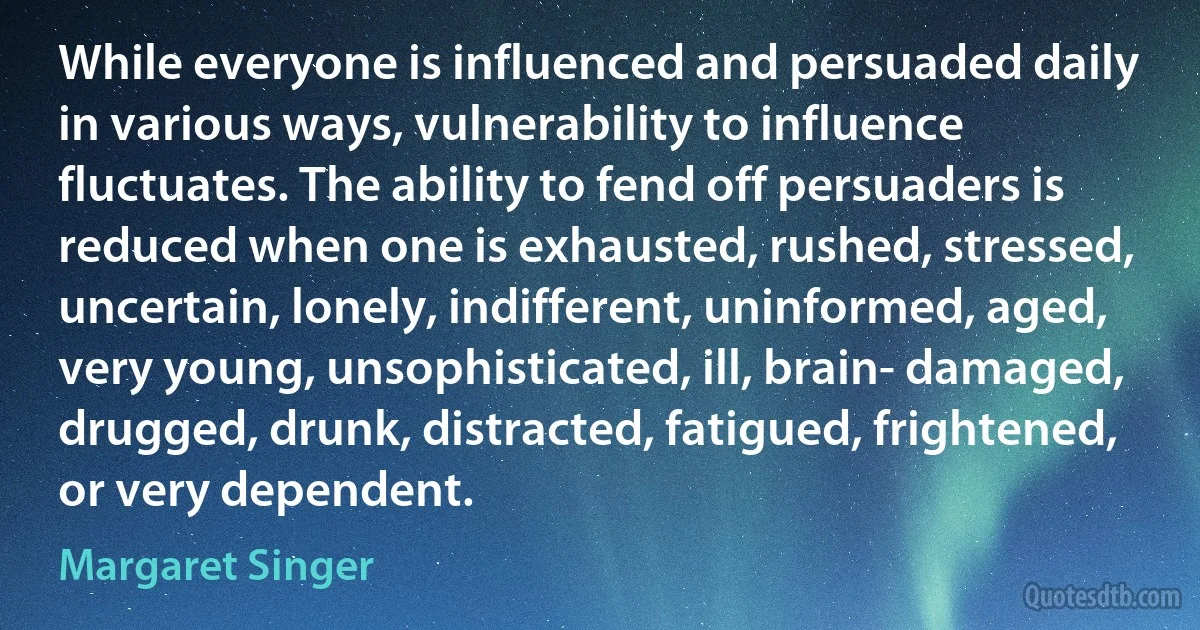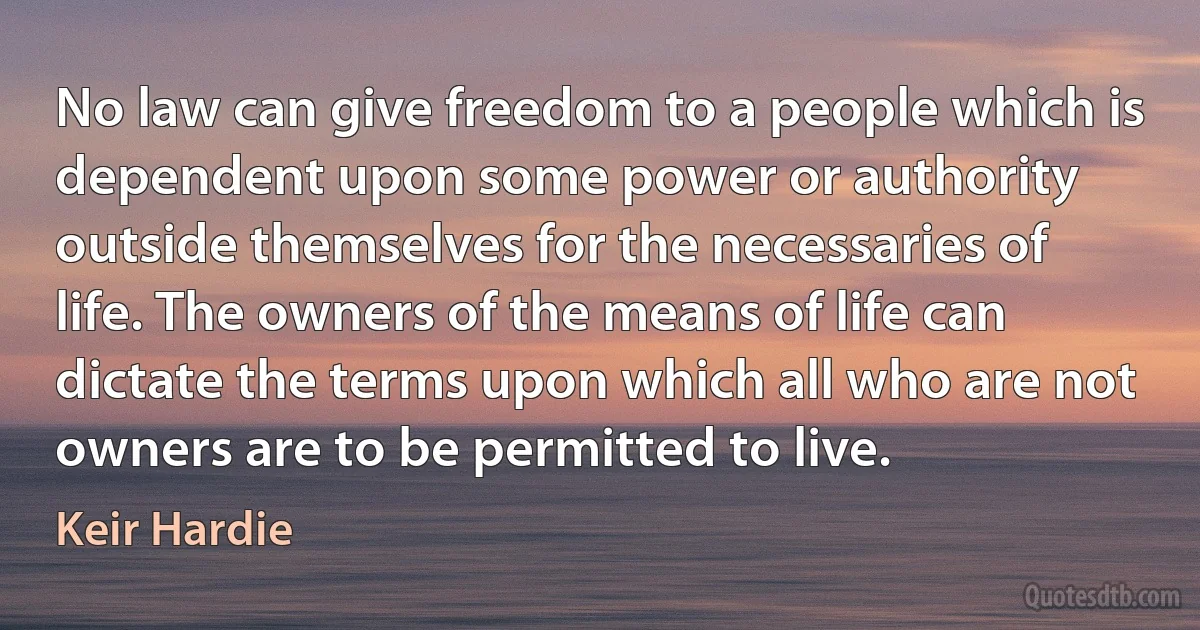Dependent Quotes - page 8
Let us say that the freedom exists, but it is limited to the one unique act of choosing the profession. Afterward all freedom is over. When he begins his studies at the university, the doctor, lawyer, or engineer is forced into an extremely rigid curriculum which ends with a series of examinations. If he passes them, he receives his license and can thereafter pursue his profession in seeming freedom. But in doing so he becomes the slave of base powers; he is dependent on success, on money, on his ambition, his hunger for fame, on whether or not people like him. He must submit to elections, must earn money, must take part in the ruthless competition of castes, families, political parties, newspapers. In return he has the freedom to become successful and well-to-do, and to be hated by the unsuccessful, or vice versa.

Hermann Hesse
Our 'overhead' expense in segregating the delinquent, the defective and the dependent, in prisons, asylums and permanent homes, our failure to segregate morons who are increasing and multiplying ... demonstrate our foolhardy and extravagant sentimentalism. No industrial corporation could maintain its existence upon such a foundation. Yet hardheaded 'captains of industry,' financiers who pride themselves upon their cool-headed and keen-sighted business ability are dropping millions into rosewater philanthropies and charities that are silly at best and vicious at worst. In our dealings with such elements there is a bland maladministration and misuse of huge sums that should in all righteousness be used for the development and education of the healthy elements of the community.

Margaret Sanger
The language of the game is interesting. You can think of the pauses as caesuras, breaks between the lines. As a poem the game is composed of a number of short lines representing the pitches. The number of lines per batter form a stanza. Then there is a space. Sometimes the stanzas become breathless, rushing full paragraphs that build rapidly on each other until the poem-inning explodes. The poem lives for this sudden blossoming out of prosodic regularity. Should someone make a computer analysis of baseball prosody, I believe that they would come up with something close to the prosody of some great American lyrical epic, Whitman's Leaves of Grass, let's say, or Doc Williams's Patterson.... The game is definitely an epic ... formed of many lyrical moments dependent on silences for their effectiveness. An unfolding story punctuated by brief emotional swellings.

Andrei Codrescu
While one welcomes aid that gets through to help the poorest people in the poorest parts of the world, does my hon. Friend share my concern that some policies, particularly those adopted by the World Bank in its advice to poor countries in receipt of loans it organises, force on those countries economic models that often involve cuts in public expenditure which make the living conditions of people dependent on public services, health, education or housing worse because those countries are pursuing some economic Valhalla similar to that pursued by the present Government? Does he believe that the Government should consider their role in multinational agencies such as the World Bank as well as my hon. Friend's obvious and quite correct concern about the lack of spending on overseas aid in general?

Jeremy Corbyn
Ultimately this virtual reality will go inside the brain and then really will be fully merging with all of the senses. Virtual reality ultimately will have all of the features of real reality plus a lot more that you can chose from millions of virtual environments. You can be someone else, you don't have to pick the same boring body every time you can be different people and different situations and over time our biological bodies will become obsolete. We'll have many bodies and we'll look back at the idea of having one body and being dependent on just one biological body and having no back-up for a mind file as a very primitive time.

Ray Kurzweil
We tried to create an open environment. In today's language, we created SOPs and SOCs (standard operating procedures, standard operating conditions) so that everybody was on the same page. We wanted an organisation where everybody contributes but the business is not dependent on a few individuals.

Mukesh Ambani
Exploitative is the key word here. It suggests that while you are free to be as sexually miserable as you like, the moment you exchange hard cash for a copy of Playboy, you are in the pornography perpetuation business, and your misery becomes political.
The truth is that pornography is just a sad affair all around. It is there because men in their hundreds of millions want it to be there. Killing pornography is like killing the messenger. The extent to which Larkin was "dependent" on pornography should be a measure our pity, or even our sympathy. But Motion hears the beep of his political pager, and he stands to attention.

Martin Amis
The framers of our Constitution came up with two major contributions to the art of government. The first was the idea of an executive not dependent on the political support of the legislature. The second was the idea of the judiciary independent of the executive and legislative branches.

William Rehnquist
We travel together, passengers on a little spaceship, dependent on its vulnerable reserves of air and soil; all committed, for our safety, to its security and peace; preserved from annihilation only by the care, the work and the love we give our fragile craft. We cannot maintain it half fortunate, half miserable, half confident, half despairing, half slave - to the ancient enemies of man - half free in a liberation of resources undreamed of until this day. No craft, no crew can travel safely with such vast contradictions. On their resolution depends the survival of us all.

Adlai Stevenson II
The national polities of the modern world maintain their existence by deliberately fostered craving and fear. ... The "free world” has become economically dependent on a fantastic system of stimulation of greed which cannot be fulfilled, sexual desire which cannot be satiated and hatred which has no outlet. ... They create populations of "preta” - hungry ghosts, with giant appetites and throats no bigger than needles. The soil, the forests and all animal life are being consumed by these cancerous collectivities; the air and water of the planet is being fouled by them.

Gary Snyder
In 1872 we sent to the protected countries of Europe and to the United States of America 116,000,000 of exported manufactures. In 1882...it fell to 88,000,000. In 1892...it fell to 75,000,000. In 1902, last year, although the general exports had increased, the exports of manufactures had decreased again to 73½ millions. And the total result of this is that after 30 years you are sending 42½ millions of manufactures less to the protected countries than you did 30 years ago. Then there the neutral countries...they have fallen 3½ millions...you have lost altogether in your export of manufactures 46 millions. How is it that that has not impressed the people before? Because the change has been concealed by our statistics... You have failed to observe that the continuance of your trade is dependent entirely on British possessions. While these foreign countries have declined 46 millions your British possessions have increased 40 millions.

Joseph Chamberlain
For my own part I believe in a British Empire, in an Empire which, although it should be its first duty to cultivate friendship with all the nations of the world, should yet, even if alone, be self-sustaining and self-sufficient, able to maintain itself against the competition of all its rivals; and I do not believe in a Little England which shall be separated from all those to whom it would in the natural course look for support and affection, a Little England which would then be dependent absolutely on the mercy of those who envy its present prosperity, and who have shown they are ready to do all in their power to prevent its future union with the British races throughout the world.

Joseph Chamberlain
The knower is the Purusa (the conscious principle) who cognizes the reflection from the Will-to-know by conjunction. The knowable consists of all the characteristics present in the essence of the Will-to know. This, then the knowable behaves like a magnet. It is useful only when placed here. On account of its capacity of knowability, it becomes the possession of the lord, the Purusa, who is of the nature of power of knowing. It becomes the object of the act of enjoyment, in as much as although by nature independent, it becomes dependent on another, existing as it does for fulfilling the object of that other.... The conjunction therewith is the cause, by giving that up is secured the complete remedy of pain, in as much as that is found to be the cause of removal the real thing, the cause of pain.

Vyasa
Man, considered as a creature, must necessarily be subject to the laws of his creator, for he is entirely a dependent being...This law of nature, being co-eval with mankind and dictated by God himself, is of course superior in obligation to any other. It is binding over all the globe, in all countries, and at all times: no human laws are of any validity, if contrary to this; and such of them as are valid derive all their force, and all their authority, mediately or immediately, from this original.

William Blackstone
For my own part I have always maintained that to claim for the Socialist movement that it is a "class" war dependent for its success upon the "class" consciousness of one section of the community is doing Socialism an injustice, and indefinitely postponing its triumph. It is, in fact, lowering it to the level of a mere faction fight. Socialism offers a platform broad enough for all to stand upon who accept its principles ... Socialism makes war upon a system, not upon a class.

Keir Hardie
[ Chernobyl has strengthened the] growing impulse to escape from the nightmare of peace being dependent upon the contemplation of horrific and mutual carnage. Events have now so developed that this aspiration can at last be rationally, logically and – I dare to add – patriotically seized by the people of the United Kingdom if they will use their votes to do so.

Enoch Powell
It is the universal hope of rising in the social scale which is the key to much of the superiority that is visible in this country. It accounts for the orderly self-respect which is the great characteristic of the masses in the United States. ... All this tends to the argument that the political condition of a people is very much dependent on its economical fate.

Richard Cobden
Total box office so far has been $22,350 ... that trickles down to $3,000 for me. Which really isn't much, but it's fine. People are seeing the film and they're seeing it the the way it should be seen. I do not feel like the distributors are ripping me off. I feel like this is the model of film distribution and this is the reality of it and fortunately my income is not dependent on it.

Nina Paley



